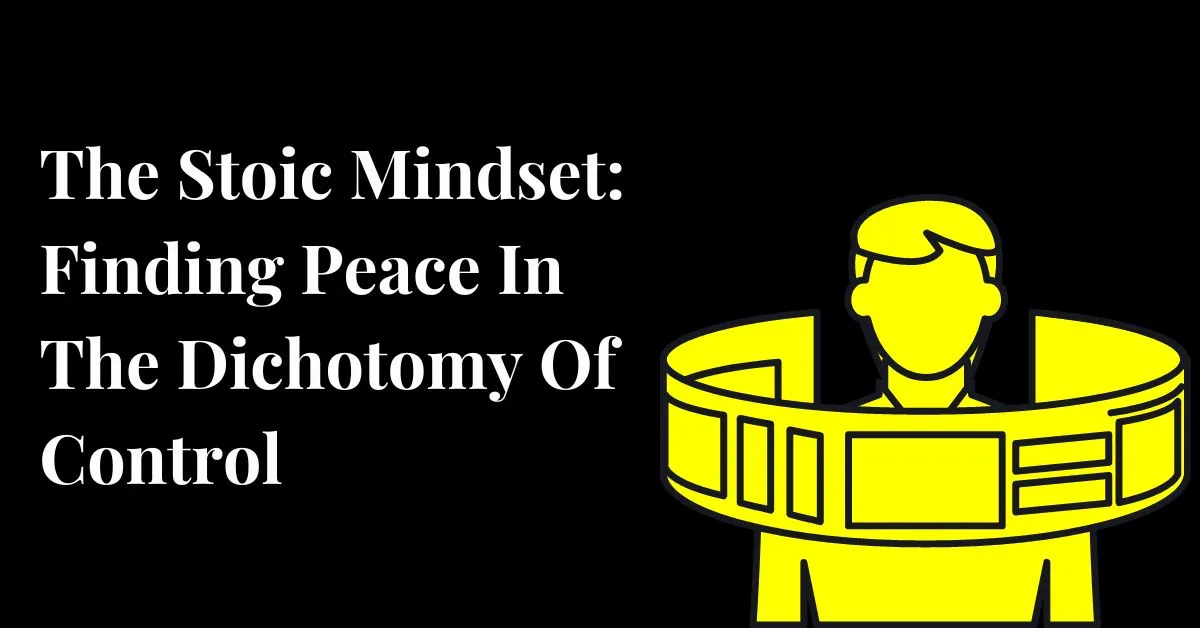In a world filled with uncertainty, stress, and chaos, it’s easy to feel overwhelmed and helpless.
At the heart of Stoicism is the dichotomy of control, a fundamental concept that encourages us to focus on what is within our control and let go of the things that are outside of our control.
In this blog post, we’ll explore the meaning of the dichotomy of control, why it’s important, and how it can be applied in daily life.
Table of Contents
What is the dichotomy of control?
According to Stoicism, everything in the world can be divided into two categories: things that are under our control and things that are outside of our control.
The Stoics believed that our thoughts, actions, and choices are the only things that we have complete control over. We may not be able to control the external circumstances of our lives, but we always have the power to control our internal response to those circumstances.
Our thoughts – We can choose to cultivate a positive, optimistic mindset, or we can choose to dwell on negative thoughts and emotions. By recognizing our negative thought patterns, we can learn to replace them with more positive and productive ones.
Our actions – We are able to choose how we behave and respond to the world around us. We can choose to act with kindness and compassion, or we can choose to act with anger and aggression. By taking responsibility for our actions, we can cultivate a sense of agency and control over our lives.
Our choices – We have the power to make conscious decisions about how we want to live our lives, and what kind of person we want to be. We can choose to live a life of virtue and purpose, or we can choose to live a life of selfishness and self-indulgence. By making deliberate choices that align with our values, we can create a life that is meaningful and fulfilling.
Why is this dichotomy important?
The desire to control other people’s behavior or emotions is a common human experience. It can arise from a need for security, a fear of vulnerability, or a desire to avoid conflict.
However, this desire can ultimately lead to frustration and resentment, as we come to realize that we cannot control other people’s thoughts or actions.
The dichotomy of control offers a solution to this problem. By recognizing that other people’s behavior and emotions are outside of our control, we can let go of the need to control them.
When we stop trying to control others, we can shift our focus to improving ourselves. We can work on developing our communication skills, cultivating compassion and kindness, and becoming better listeners. These skills can help us build stronger, more meaningful relationships, based on mutual trust and respect.
Criticisms of the dichotomy of control
While the dichotomy of control is a powerful tool for cultivating a sense of inner peace and resilience, it is not without its criticisms.
It can be seen as fatalistic or passive
Critics of the dichotomy of control argue that by focusing only on what is within our control, we may become resigned to the things that are outside of our control and fail to take action to change them.
This argument suggests that by accepting our lack of control over certain situations, we may become complacent and unwilling to challenge the status quo.
While it is true that the dichotomy of control encourages us to focus our efforts on what we can change, this does not mean that we should simply accept the things that are outside of our control. Instead, the Stoics believed that by accepting the things that we cannot change, we free up our energy to focus on the things that we can change.
It can be difficult to determine what is within our control
While it is true that our thoughts and actions are generally considered to be within our control, there are many factors that can influence them. These factors can include our upbringing, environment, and biology, among others.
For example, our upbringing can shape our beliefs, values, and habits, which can influence the way we think and act in different situations. Our environment can also have a significant impact on our thoughts and actions, as we are constantly exposed to different stimuli that can affect our behavior.
Moreover, our biology can also play a role in influencing our thoughts and actions. Our brain chemistry, hormones, and genetics can all impact the way we perceive and respond to different situations.
Given these complex and interconnected factors, it can be challenging to determine what we can and cannot control in any given situation. While we may be able to control our thoughts and actions to some extent, there are many factors that can influence them, and some of these factors may be outside of our control.
Conclusion
The dichotomy of control is a core principle of Stoicism that suggests we focus on what we can control and let go of what we cannot.
By adopting a Stoic mindset, we can become more mindful of our thoughts and actions, more accepting of the things we cannot control, and more focused on the things we can control. In this way, Stoicism can help us lead a more fulfilling, peaceful, and meaningful life.

